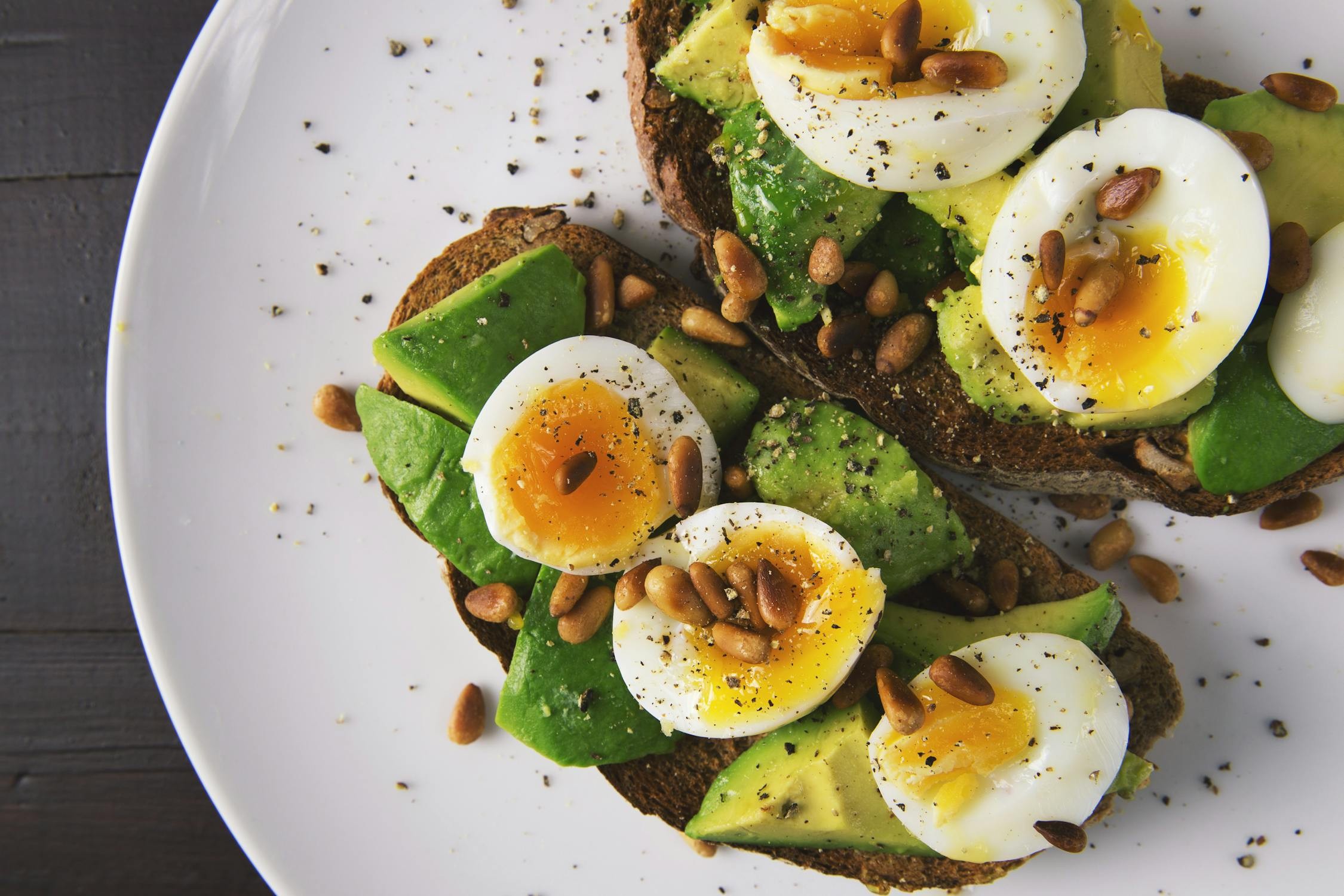What Foods To Eat To Build Muscle Mass is a crucial question for anyone looking to enhance their physique and overall strength, and FOODS.EDU.VN is here to guide you. Fueling your body with the right nutrients is paramount for muscle growth, repair, and optimal performance, so discover how to leverage protein-rich foods and smart nutrition for impressive muscle gains. Explore the best muscle-building foods, nutrition strategies, and muscle recovery secrets.
1. Understanding the Fundamentals of Muscle Building
Building muscle involves more than just lifting weights; it’s a comprehensive process that relies heavily on proper nutrition. Understanding the interplay between exercise, diet, and recovery is crucial for achieving optimal results. Let’s delve into the core principles that underpin effective muscle building.
1.1. The Role of Protein in Muscle Growth
Protein is the cornerstone of muscle building. It provides the amino acids necessary to repair and rebuild muscle tissue damaged during exercise. The body breaks down protein into amino acids, which are then used to synthesize new muscle proteins.
- Essential Amino Acids: These cannot be produced by the body and must be obtained from food. They include leucine, isoleucine, valine, lysine, threonine, methionine, phenylalanine, and tryptophan.
- Complete vs. Incomplete Proteins: Complete proteins contain all nine essential amino acids in adequate amounts, while incomplete proteins do not. Animal-based foods like meat, poultry, and dairy are complete proteins, while plant-based foods like beans and grains are often incomplete.
- Protein Timing: Consuming protein at regular intervals throughout the day, especially after workouts, helps maximize muscle protein synthesis.
1.2. The Importance of Calories and Macronutrients
To build muscle, you need to consume more calories than you burn. This caloric surplus provides the energy needed to support muscle growth. Macronutrients – protein, carbohydrates, and fats – each play a vital role.
- Protein: Aim for 1.6 to 2.2 grams of protein per kilogram of body weight per day.
- Carbohydrates: Provide energy for workouts and help replenish glycogen stores in muscles. Good sources include whole grains, fruits, and vegetables.
- Fats: Essential for hormone production and overall health. Choose healthy fats like those found in avocados, nuts, and olive oil.
1.3. The Impact of Hormones on Muscle Mass
Hormones such as testosterone, growth hormone, and insulin-like growth factor 1 (IGF-1) play significant roles in muscle growth. These hormones promote protein synthesis, inhibit muscle breakdown, and enhance recovery.
- Testosterone: A primary anabolic hormone that stimulates muscle growth and strength gains.
- Growth Hormone: Supports muscle growth by promoting protein synthesis and fat loss.
- IGF-1: Mediates the effects of growth hormone and plays a crucial role in muscle repair and growth.
1.4. The Significance of Rest and Recovery
Muscle growth occurs during rest, not during exercise. Adequate sleep and recovery periods are essential for allowing muscles to repair and rebuild.
- Sleep: Aim for 7-9 hours of quality sleep per night to optimize hormone production and muscle recovery.
- Active Recovery: Light activities like walking or stretching can improve blood flow to muscles and reduce soreness.
- Stress Management: Chronic stress can elevate cortisol levels, which can hinder muscle growth. Practice stress-reducing techniques like meditation or yoga.
2. Top Protein Sources for Muscle Growth
Choosing the right protein sources is vital for maximizing muscle growth. High-quality protein sources provide the essential amino acids your body needs to repair and build muscle tissue. Let’s explore some of the best protein sources available.
2.1. Lean Meats: Beef, Chicken, and Turkey
Lean meats are excellent sources of high-quality protein. They contain all the essential amino acids needed for muscle growth and are also rich in nutrients like iron and zinc.
- Beef: Opt for lean cuts like sirloin, flank steak, and 90% lean ground beef.
- Chicken: Skinless chicken breast is a versatile and lean protein source.
- Turkey: Similar to chicken, turkey breast is low in fat and high in protein.
| Lean Meat | Protein per 100g | Key Nutrients | Benefits |
|---|---|---|---|
| Beef (Lean) | 26g | Iron, Zinc, Vitamin B12 | Supports muscle growth, boosts energy levels, enhances immune function |
| Chicken | 31g | Niacin, Selenium, Vitamin B6 | Promotes muscle repair, supports metabolism, aids in nervous system function |
| Turkey | 30g | Tryptophan, Selenium, Vitamin B12 | Supports muscle recovery, improves sleep quality, contributes to overall health and well-being |





2.2. Fish and Seafood: Salmon, Tuna, and Shrimp
Fish and seafood are not only excellent sources of protein but also provide essential omega-3 fatty acids, which are beneficial for overall health and can aid in muscle recovery.
- Salmon: Rich in omega-3 fatty acids, which reduce inflammation and support heart health.
- Tuna: A great source of protein and omega-3 fatty acids, especially when consumed fresh.
- Shrimp: Low in calories and high in protein, making it a great addition to a muscle-building diet.
2.3. Eggs: A Versatile Protein Source
Eggs are a complete protein source, meaning they contain all nine essential amino acids. They are also rich in vitamins and minerals, making them a nutrient-dense food for muscle growth.
- Egg Whites: Primarily composed of protein and low in calories.
- Egg Yolks: Contain healthy fats, vitamins, and minerals.
- Whole Eggs: Provide a balance of protein, fats, and nutrients, making them an ideal choice for muscle building.
2.4. Dairy Products: Milk, Yogurt, and Cheese
Dairy products are excellent sources of protein and calcium, which are essential for bone health and muscle function.
- Milk: Contains both casein and whey protein, providing a sustained release of amino acids.
- Yogurt: Greek yogurt is particularly high in protein and low in fat, making it a great option for muscle building.
- Cheese: Cottage cheese is a good source of casein protein, which is slowly digested and can help prevent muscle breakdown during sleep.
2.5. Plant-Based Proteins: Legumes, Tofu, and Quinoa
For vegetarians and vegans, plant-based protein sources are essential for building muscle.
- Legumes: Beans, lentils, and peas are high in protein and fiber.
- Tofu: Made from soybeans, tofu is a versatile protein source that can be used in a variety of dishes.
- Quinoa: A complete protein source that is also high in fiber and essential nutrients.
3. Optimizing Your Diet for Muscle Mass
To maximize muscle growth, it’s not just about eating protein; it’s about optimizing your entire diet. This includes balancing macronutrients, timing your meals, and incorporating nutrient-rich foods.
3.1. Balancing Macronutrients: Protein, Carbs, and Fats
A well-balanced diet should include adequate amounts of protein, carbohydrates, and fats. Each macronutrient plays a unique role in supporting muscle growth and overall health.
- Protein: As mentioned earlier, aim for 1.6 to 2.2 grams of protein per kilogram of body weight per day.
- Carbohydrates: Choose complex carbohydrates like whole grains, fruits, and vegetables to provide sustained energy.
- Fats: Incorporate healthy fats from sources like avocados, nuts, seeds, and olive oil.
3.2. Meal Timing: Pre- and Post-Workout Nutrition
When you eat can be just as important as what you eat. Timing your meals around your workouts can help maximize muscle protein synthesis and recovery.
- Pre-Workout: Consume a meal or snack that includes both protein and carbohydrates about 1-2 hours before your workout.
- Post-Workout: Consume a protein-rich meal or shake within 30-60 minutes after your workout to help repair and rebuild muscle tissue.
3.3. Hydration: The Importance of Water Intake
Water is essential for all bodily functions, including muscle growth and recovery. Dehydration can impair performance and hinder muscle protein synthesis.
- Daily Intake: Aim for at least 3-4 liters of water per day, especially if you are physically active.
- Electrolytes: Replenish electrolytes lost through sweat, especially during intense workouts.
3.4. Supplementation: When and What to Use
While a well-balanced diet should be your primary focus, certain supplements can help support muscle growth.
- Whey Protein: A fast-digesting protein source that is ideal for post-workout recovery.
- Creatine: Enhances muscle strength and power, and promotes muscle growth.
- Branched-Chain Amino Acids (BCAAs): Can help reduce muscle soreness and promote recovery.
| Supplement | Benefits | Recommended Dosage |
|---|---|---|
| Whey Protein | Supports muscle recovery, increases protein intake | 20-30 grams post-workout |
| Creatine | Enhances muscle strength and power, promotes muscle growth | 3-5 grams per day |
| BCAAs | Reduces muscle soreness, promotes recovery | 5-10 grams before, during, or after workouts |
4. Sample Meal Plans for Building Muscle Mass
To give you a better idea of how to structure your diet for muscle growth, here are a few sample meal plans. These plans provide a balance of protein, carbohydrates, and fats, and can be adjusted to fit your individual needs and preferences.
4.1. Sample Meal Plan for a 75kg Individual
This meal plan is designed for a 75kg individual aiming to build muscle. It provides approximately 2250-2750 calories, with a macronutrient breakdown of roughly 40% protein, 40% carbohydrates, and 20% fats.
- Breakfast (7:00 AM): Oatmeal with protein powder, berries, and nuts.
- Mid-Morning Snack (10:00 AM): Greek yogurt with fruit and a handful of almonds.
- Lunch (1:00 PM): Grilled chicken salad with mixed greens, vegetables, and a light vinaigrette.
- Pre-Workout Snack (4:00 PM): Apple slices with peanut butter.
- Post-Workout Meal (7:00 PM): Whey protein shake with a banana.
- Dinner (9:00 PM): Baked salmon with roasted vegetables and quinoa.
4.2. Vegetarian Meal Plan for Muscle Growth
This meal plan is tailored for vegetarians aiming to build muscle. It focuses on plant-based protein sources and provides a balanced intake of macronutrients.
- Breakfast (7:00 AM): Tofu scramble with vegetables and whole-wheat toast.
- Mid-Morning Snack (10:00 AM): Protein smoothie with spinach, banana, and almond milk.
- Lunch (1:00 PM): Lentil soup with a side of whole-grain bread.
- Pre-Workout Snack (4:00 PM): Edamame with a sprinkle of sea salt.
- Post-Workout Meal (7:00 PM): Plant-based protein shake with a handful of berries.
- Dinner (9:00 PM): Quinoa bowl with black beans, corn, avocado, and salsa.
4.3. Vegan Meal Plan for Muscle Growth
For vegans, building muscle requires careful planning to ensure adequate protein intake. This meal plan focuses on diverse plant-based protein sources.
- Breakfast (7:00 AM): Chia seed pudding with soy milk, berries, and nuts.
- Mid-Morning Snack (10:00 AM): Vegan protein bar.
- Lunch (1:00 PM): Tempeh sandwich with avocado, lettuce, and tomato on whole-grain bread.
- Pre-Workout Snack (4:00 PM): Rice cakes with almond butter and banana slices.
- Post-Workout Meal (7:00 PM): Vegan protein shake with spinach and flax seeds.
- Dinner (9:00 PM): Stir-fried tofu with brown rice and mixed vegetables.
5. Common Mistakes to Avoid When Building Muscle
Building muscle can be challenging, and it’s easy to make mistakes that can hinder your progress. Here are some common pitfalls to avoid.
5.1. Not Eating Enough Protein
Insufficient protein intake is one of the most common mistakes when trying to build muscle. Ensure you are consuming enough protein to support muscle repair and growth.
5.2. Ignoring Carbohydrates and Fats
While protein is essential, carbohydrates and fats also play important roles in muscle building. Cutting them out completely can lead to energy deficits and hormonal imbalances.
5.3. Neglecting Calories
To build muscle, you need to consume more calories than you burn. A caloric deficit can prevent muscle growth and even lead to muscle loss.
5.4. Over Training and Lack of Rest
Overtraining without adequate rest can lead to muscle breakdown and increased risk of injury. Allow your muscles time to recover between workouts.
5.5. Inconsistent Training and Diet
Consistency is key to building muscle. Sporadic training and inconsistent dieting can prevent you from achieving your goals.
6. How to Track Your Progress Effectively
Tracking your progress is crucial for staying motivated and making necessary adjustments to your training and diet. Here are some effective ways to monitor your muscle-building journey.
6.1. Measuring Body Composition
Monitoring changes in body composition can help you assess whether you are gaining muscle and losing fat.
- Body Weight: Track your weight regularly to monitor overall changes.
- Body Fat Percentage: Use calipers, bioelectrical impedance analysis (BIA), or DEXA scans to measure body fat percentage.
- Muscle Mass: Track changes in muscle mass using DEXA scans or other advanced methods.
6.2. Strength and Performance Metrics
Tracking your strength and performance in the gym can provide valuable insights into your progress.
- Weight Lifting: Monitor the amount of weight you can lift for various exercises.
- Repetitions and Sets: Track the number of repetitions and sets you can perform.
- Workout Logs: Keep a detailed log of your workouts to track progress over time.
6.3. Visual Progress: Photos and Measurements
Taking regular photos and measurements can help you track visual changes in your physique.
- Photos: Take photos of yourself every few weeks to monitor changes in muscle size and definition.
- Measurements: Measure the circumference of your arms, chest, legs, and waist to track muscle growth and fat loss.
7. Addressing Individual Needs and Considerations
Everyone’s body is different, and what works for one person may not work for another. It’s important to consider individual needs and adjust your diet and training accordingly.
7.1. Age and Muscle Building
As you age, it can become more challenging to build muscle. However, it’s still possible with proper training and nutrition.
- Sarcopenia: Age-related muscle loss can be mitigated with resistance training and adequate protein intake.
- Hormone Levels: Age-related declines in hormone levels can impact muscle growth. Consult with a healthcare provider to discuss potential interventions.
7.2. Gender Differences in Muscle Growth
Men and women have different hormonal profiles, which can impact muscle growth.
- Testosterone: Men typically have higher levels of testosterone, which supports greater muscle growth.
- Training Adaptations: Women can still build significant muscle mass with resistance training, although they may not achieve the same level of muscle growth as men.
7.3. Dietary Restrictions and Allergies
If you have dietary restrictions or allergies, it’s important to find alternative protein sources and ensure you are meeting your nutritional needs.
- Vegetarian and Vegan Options: Focus on plant-based protein sources like legumes, tofu, and quinoa.
- Allergies: Avoid foods that trigger allergic reactions and find suitable alternatives.
8. Latest Research and Trends in Muscle Building Nutrition
Staying up-to-date with the latest research and trends in muscle-building nutrition can help you optimize your diet and training.
8.1. The Role of Specific Amino Acids
Research continues to explore the role of specific amino acids in muscle growth and recovery.
- Leucine: A key amino acid that triggers muscle protein synthesis.
- HMB (β-Hydroxy β-Methylbutyrate): A metabolite of leucine that may help reduce muscle breakdown.
8.2. Plant-Based Protein Research
Studies are increasingly showing the effectiveness of plant-based protein sources for building muscle.
- Soy Protein: A complete protein source that can support muscle growth.
- Pea Protein: A high-quality protein source that is easily digested.
8.3. Personalized Nutrition Approaches
Personalized nutrition approaches are gaining traction, with researchers exploring how individual genetic profiles can influence dietary recommendations for muscle building.
| Research Area | Key Findings | Implications for Muscle Building |
|---|---|---|
| Specific Amino Acids | Leucine triggers muscle protein synthesis; HMB reduces muscle breakdown | Focus on leucine-rich foods or supplements; consider HMB supplementation |
| Plant-Based Protein | Soy and pea protein are effective for muscle growth | Incorporate diverse plant-based protein sources |
| Personalized Nutrition | Genetic profiles can influence dietary needs for muscle building | Consult with a nutritionist for personalized recommendations |
9. Delicious and Nutritious Muscle-Building Recipes
Incorporating muscle-building foods into your diet doesn’t have to be boring. Here are a few delicious and nutritious recipes to help you reach your goals.
9.1. Grilled Chicken and Quinoa Bowl
This recipe provides a balanced combination of protein, carbohydrates, and healthy fats.
Ingredients:
- Grilled chicken breast
- Cooked quinoa
- Black beans
- Corn
- Avocado
- Salsa
Instructions:
- Grill the chicken breast until cooked through.
- Combine quinoa, black beans, and corn in a bowl.
- Top with grilled chicken, avocado, and salsa.
9.2. Salmon with Roasted Vegetables
This recipe is rich in protein, omega-3 fatty acids, and essential nutrients.
Ingredients:
- Salmon fillet
- Broccoli
- Bell peppers
- Sweet potatoes
- Olive oil
- Herbs and spices
Instructions:
- Preheat oven to 400°F (200°C).
- Toss vegetables with olive oil, herbs, and spices.
- Roast vegetables for 20 minutes.
- Bake salmon fillet for 12-15 minutes.
9.3. Protein Pancakes
These pancakes are a delicious and protein-packed breakfast option.
Ingredients:
- Protein powder
- Oatmeal
- Egg whites
- Banana
- Baking powder
Instructions:
- Combine all ingredients in a blender.
- Pour batter onto a preheated griddle.
- Cook until golden brown on both sides.
10. Expert Tips for Sustainable Muscle Growth
Building muscle is a long-term process that requires dedication and consistency. Here are some expert tips to help you achieve sustainable muscle growth.
10.1. Set Realistic Goals
Setting realistic goals can help you stay motivated and avoid burnout.
- Incremental Progress: Focus on making small, consistent improvements over time.
- Patience: Muscle growth takes time, so be patient and persistent.
10.2. Prioritize Sleep and Recovery
Adequate sleep and recovery are essential for muscle growth.
- Sleep Hygiene: Practice good sleep hygiene to improve sleep quality.
- Rest Days: Incorporate rest days into your training schedule to allow muscles to recover.
10.3. Stay Consistent with Your Diet and Training
Consistency is key to achieving sustainable muscle growth.
- Meal Planning: Plan your meals in advance to ensure you are meeting your nutritional needs.
- Training Schedule: Stick to a consistent training schedule to maximize muscle growth.
10.4. Seek Professional Guidance
Consider seeking guidance from a qualified nutritionist or personal trainer.
- Personalized Plans: A professional can help you create a personalized diet and training plan tailored to your individual needs and goals.
- Expert Advice: A professional can provide expert advice and support to help you overcome challenges and achieve your muscle-building goals.
By understanding the fundamentals of muscle building, choosing the right protein sources, optimizing your diet, and avoiding common mistakes, you can effectively build muscle mass and achieve your fitness goals. Remember, consistency, patience, and a well-rounded approach are key to sustainable success.
Are you eager to dive deeper into the world of nutrition and fitness? FOODS.EDU.VN offers a wealth of resources, from detailed recipe guides to expert articles on building muscle and maintaining a healthy lifestyle. Unlock your full potential by visiting us at foods.edu.vn and discover more invaluable insights. For personalized advice and support, reach out to us at 1946 Campus Dr, Hyde Park, NY 12538, United States, or connect via Whatsapp at +1 845-452-9600. Your journey to a stronger, healthier you starts here.
FAQ: What Foods to Eat to Build Muscle Mass
Here are 10 frequently asked questions about what foods to eat to build muscle mass, designed to provide quick and informative answers to common queries.
-
What are the best foods to eat to build muscle mass?
The best foods include lean meats (beef, chicken, turkey), fish (salmon, tuna), eggs, dairy products (milk, yogurt, cheese), legumes, tofu, and quinoa.
-
How much protein do I need to eat to build muscle?
Aim for 1.6 to 2.2 grams of protein per kilogram of body weight per day.
-
Are supplements necessary to build muscle?
While a well-balanced diet is essential, certain supplements like whey protein, creatine, and BCAAs can support muscle growth.
-
Can vegetarians and vegans build muscle?
Yes, vegetarians and vegans can build muscle by focusing on plant-based protein sources like legumes, tofu, quinoa, and plant-based protein supplements.
-
What should I eat before and after a workout to build muscle?
Before a workout, consume a meal or snack with both protein and carbohydrates. After a workout, consume a protein-rich meal or shake within 30-60 minutes.
-
How important is hydration for muscle growth?
Water is essential for all bodily functions, including muscle growth and recovery. Aim for at least 3-4 liters of water per day.
-
What are some common mistakes to avoid when building muscle?
Common mistakes include not eating enough protein, ignoring carbohydrates and fats, neglecting calories, overtraining, and inconsistent training and diet.
-
How can I track my progress effectively?
Track your progress by measuring body composition, monitoring strength and performance metrics, and taking regular photos and measurements.
-
How does age affect muscle building?
As you age, it can become more challenging to build muscle due to age-related muscle loss and declines in hormone levels. However, it’s still possible with proper training and nutrition.
-
Are there any dietary restrictions I should consider when building muscle?
If you have dietary restrictions or allergies, find alternative protein sources and ensure you are meeting your nutritional needs.

